Ford Kuga vs Jaguar E-Pace - Differences and prices compared
Compare performance (243 HP vs 269 HP), boot space and price (34200 £ vs 32400 £) at a glance. Find out which car is the better choice for you – Ford Kuga or Jaguar E-Pace?
Costs and Efficiency:
Price and efficiency are key factors when choosing a car – and this is often where the real differences emerge.
Jaguar E-Pace has a minimal advantage in terms of price – it starts at 32400 £, while the Ford Kuga costs 34200 £. That’s a price difference of around 1842 £.
Fuel consumption also shows a difference: Jaguar E-Pace manages with 1.40 L and is therefore decisively more efficient than the Ford Kuga with 2.80 L. The difference is about 1.40 L per 100 km.
As for range, the Jaguar E-Pace performs slight better – achieving up to 69 km, about 1 km more than the Ford Kuga.
Engine and Performance:
Under the bonnet, it becomes clear which model is tuned for sportiness and which one takes the lead when you hit the accelerator.
When it comes to engine power, the Jaguar E-Pace has a slight edge – offering 269 HP compared to 243 HP. That’s roughly 26 HP more horsepower.
Both models accelerate almost equally fast – 7.30 s from 0 to 100 km/h.
In terms of top speed, the Jaguar E-Pace performs slight better – reaching 211 km/h, while the Ford Kuga tops out at 200 km/h. The difference is around 11 km/h.
There’s also a difference in torque: Jaguar E-Pace pulls clearly stronger with 540 Nm compared to 240 Nm. That’s about 300 Nm difference.
Space and Everyday Use:
Cabin size, boot volume and payload all play a role in everyday practicality. Here, comfort and flexibility make the difference.
Both vehicles offer seating for 5 people.
In curb weight, Ford Kuga is a bit lighter – 1526 kg compared to 1783 kg. The difference is around 257 kg.
In terms of boot space, the Jaguar E-Pace offers a bit more room – 494 L compared to 412 L. That’s a difference of about 82 L.
In maximum load capacity, the Ford Kuga performs noticeable better – up to 1534 L, which is about 364 L more than the Jaguar E-Pace.
When it comes to payload, Jaguar E-Pace minimal takes the win – 554 kg compared to 550 kg. That’s a difference of about 4 kg.
Who wins the race?
The Jaguar E-Pace proves to be outperforms in nearly all aspects and therefore becomes our DriveDuel Champion!
Jaguar E-Pace is the better all-rounder in this comparison.
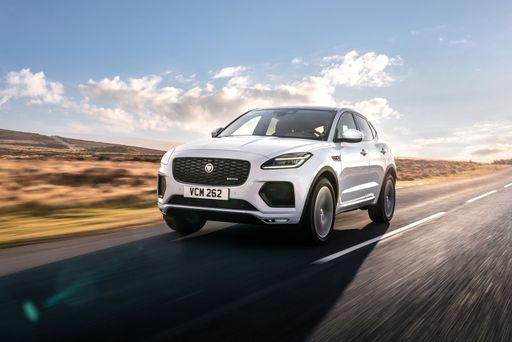
Jaguar E-Pace
Costs and Consumption
View detailed analysis
Engine and Performance
View detailed analysis
Dimensions and Body
View detailed analysis
Ford Kuga
The Kuga is Ford’s adaptable family SUV that blends usable space with a surprisingly lively driving character, making daily commutes and weekend escapes equally enjoyable. With smart interior packaging, an easy-to-use infotainment setup and composed road manners, it’s a sensible choice for buyers who want a bit of fun without the fuss.
details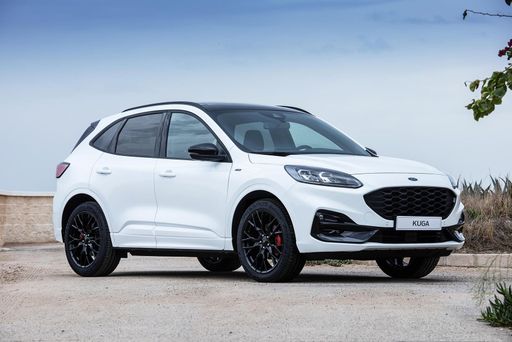
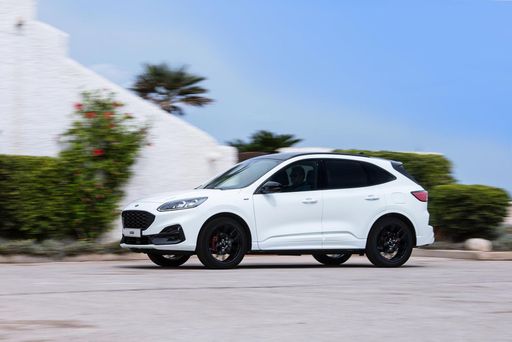

Jaguar E-Pace
The Jaguar E-Pace brings compact SUV practicality together with taut, sporty design and unmistakable British charm, helping it stand out in a crowded class. Inside, the cabin feels premium and the driving manners are engaging enough to keep a grin on your face, making it a tempting choice for buyers who want Jaguar style without the bulk.
details
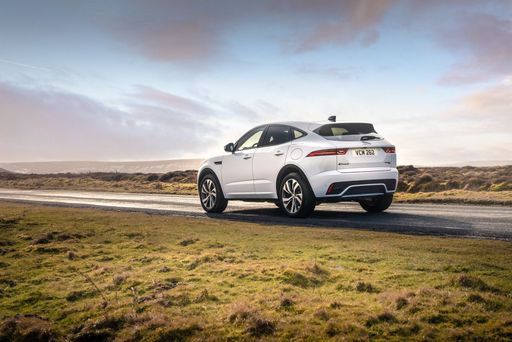
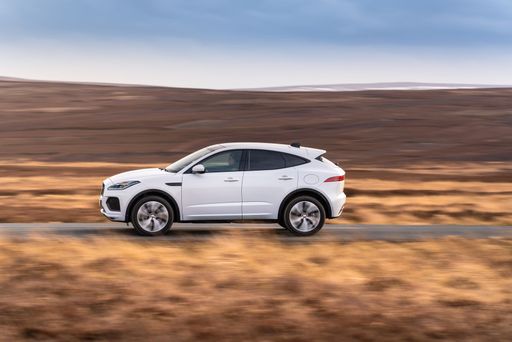
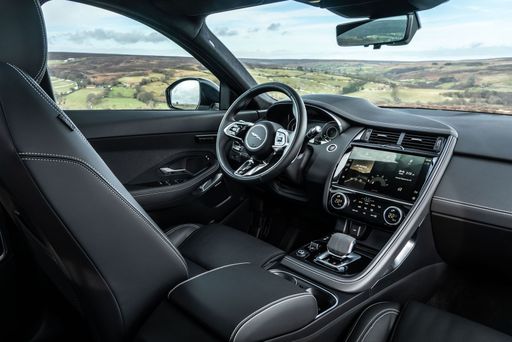
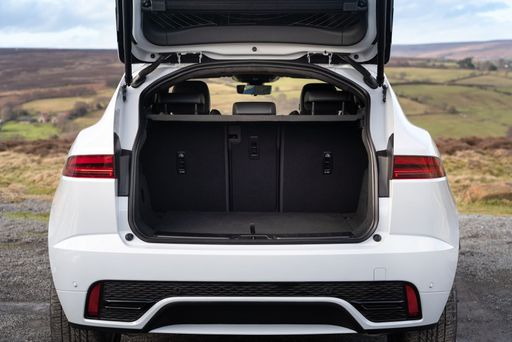

|

|
|
|
|
Costs and Consumption |
|
|---|---|
|
Price
34200 - 46300 £
|
Price
32400 - 56100 £
|
|
Consumption L/100km
2.8 - 6.8 L
|
Consumption L/100km
1.4 - 8.2 L
|
|
Consumption kWh/100km
-
|
Consumption kWh/100km
-
|
|
Electric Range
68 km
|
Electric Range
69 km
|
|
Battery Capacity
1.1 - 14.4 kWh
|
Battery Capacity
11.50 kWh
|
|
co2
55 - 154 g/km
|
co2
33 - 185 g/km
|
|
Fuel tank capacity
42 - 54 L
|
Fuel tank capacity
56 - 67 L
|
Dimensions and Body |
|
|---|---|
|
Body Type
SUV
|
Body Type
SUV
|
|
Seats
5
|
Seats
5
|
|
Doors
5
|
Doors
5
|
|
Curb weight
1526 - 1859 kg
|
Curb weight
1783 - 2173 kg
|
|
Trunk capacity
412 L
|
Trunk capacity
494 L
|
|
Length
4604 - 4645 mm
|
Length
4395 mm
|
|
Width
1882 mm
|
Width
1984 mm
|
|
Height
1673 - 1681 mm
|
Height
1648 mm
|
|
Max trunk capacity
1534 L
|
Max trunk capacity
1170 L
|
|
Payload
541 - 550 kg
|
Payload
497 - 554 kg
|
Engine and Performance |
|
|---|---|
|
Engine Type
Petrol, Full Hybrid, Plugin Hybrid
|
Engine Type
Plugin Hybrid, Diesel MHEV, Petrol MHEV
|
|
Transmission
Manuel, Automatic
|
Transmission
Automatic
|
|
Transmission Detail
Manual Gearbox, CVT, Automatic Gearbox
|
Transmission Detail
Automatic Gearbox
|
|
Drive Type
Front-Wheel Drive, All-Wheel Drive
|
Drive Type
All-Wheel Drive, Front-Wheel Drive
|
|
Power HP
150 - 243 HP
|
Power HP
160 - 269 HP
|
|
Acceleration 0-100km/h
7.3 - 9.9 s
|
Acceleration 0-100km/h
7.3 - 10.5 s
|
|
Max Speed
195 - 200 km/h
|
Max Speed
190 - 211 km/h
|
|
Torque
240 Nm
|
Torque
260 - 540 Nm
|
|
Number of Cylinders
3 - 4
|
Number of Cylinders
3 - 4
|
|
Power kW
111 - 178 kW
|
Power kW
118 - 198 kW
|
|
Engine capacity
1496 - 2488 cm3
|
Engine capacity
1498 - 1998 cm3
|
General |
|
|---|---|
|
Model Year
2025
|
Model Year
2024
|
|
CO2 Efficiency Class
E, D, B
|
CO2 Efficiency Class
B, G
|
|
Brand
Ford
|
Brand
Jaguar
|
What drivetrain options does the Ford Kuga have?
The Ford Kuga is available as Front-Wheel Drive or All-Wheel Drive.
The prices and data displayed are estimates based on German list prices and may vary by country. This information is not legally binding.
